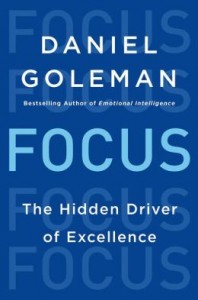
Daniel Goleman returned to Berkeley not long ago to speak to a large and enthusiastic audience at International House about the themes in his new book, Focus. Though he’d spent only his junior year as an undergraduate at Cal, his quips and asides quickly showed him to be fully in synch with Berkeley’s humane values. Though he never stated the point explicitly, it was also clear that Goleman saw the roots of the community’s concerns in the chemistry of our brains.
You may remember Goleman as the author of the huge 1995 bestseller, Emotional Intelligence, which taught us all that psychological factors other than IQ were better predictors of success on the job and in life. Goleman was trained as a psychologist but soon after his post-doctoral studies turned his hand to science journalism, writing about new developments in brain science and related topics for The New York Times for a dozen years and later turning to writing independently. Over the years, he has shifted back and forth from teaching and research to science writing and back again. To date, he has produced ten books. Focus is the most recent.
Focus: The Hidden Driver of Excellence by Daniel Goleman ★★★☆☆
I vividly recall devouring Emotional Intelligence much as I would a compelling murder mystery. The book was a revelation. Focus falls far short of it. To begin with, the book’s central theme — that focused attention improves outcomes in daily life, in work, in sports, and in leadership — is no surprise at all. Many others have delivered this message over the millennia, from the yoga masters of India to Mihály Csíkszentmihályi, who introduced us to the concept of “flow” — the single-minded immersion that, like Goleman’s focus, enables peak performance. No doubt, Goleman’s new book updates the brain science underlying these concepts, but his repeated overuse of the anatomical labels for obscure regions of the brain would have been better suited for a professional audience rather than the general reader.
The author’s academic posturing aside, I found Focus fascinating when Goleman described the application of contemporary psychological tools to pre-school and primary education. (Parents with children in school today may find this subject all too familiar; I didn’t.) The extraordinary improvement in school performance brought about by exercises in mindfulness was startling news. And the application of similar training methods in various aspects of emotional intelligence yielded similarly impressive results in the workplace, boosting job performance, job satisfaction, and workforce morale. Clearly, there’s something truly significant going on here. I just wish Goleman had found a way to report it in a more accessible and congenial way.
For further reading
You might also enjoy Science explained in 10 excellent popular books.
If you enjoy reading nonfiction in general, you might also enjoy:
- Great biographies I’ve reviewed: my 10 favorites
- My 10 favorite books about business history
- 20 top nonfiction books about history
- The 10 most memorable nonfiction books of the decade
And you can always find my most popular reviews, and the most recent ones, plus a guide to this whole site, on the Home Page.



























